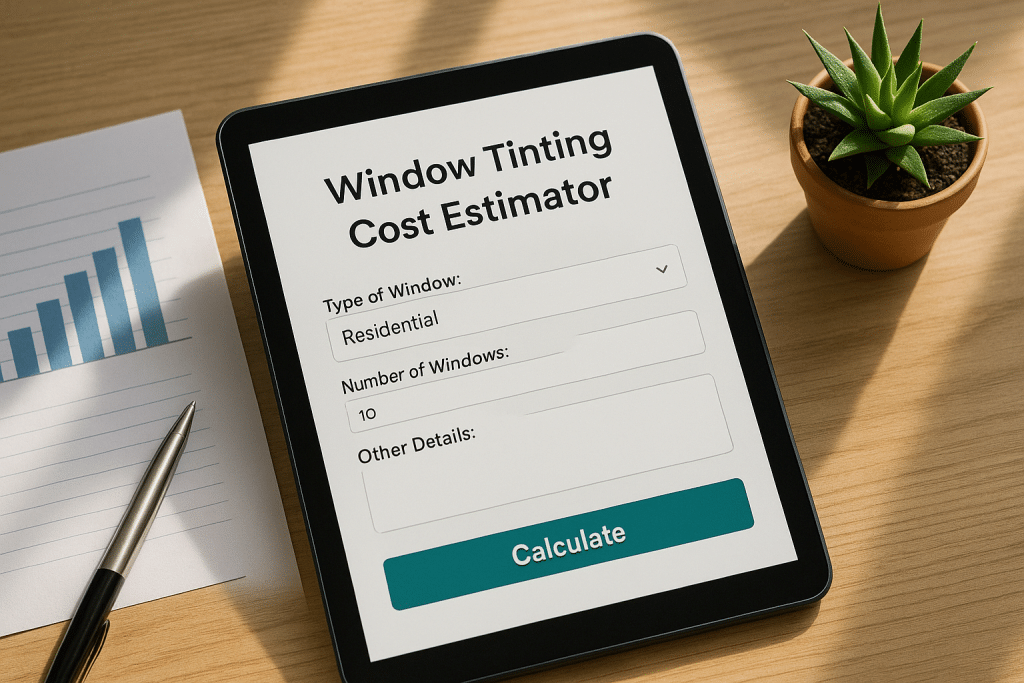Window tinting isn’t just for cars — it’s also a smart, energy-efficient upgrade for your home. Window film can deliver long-term value if you’re trying to reduce glare, lower energy bills, or improve privacy. In Southern California, where the sun blazes most of the year, homeowners increasingly tint their windows to protect interiors, enhance comfort, and improve curb appeal.
From luxury homes in La Jolla to coastal condos in Mission Beach, San Diegans are switching for good reasons: lower cooling costs, UV protection, and added privacy — all without sacrificing natural light.

Average Cost to Tint Home Windows
So, how much does it cost to tint home windows in San Diego?
On average, residential window tinting costs between $6 and $12 per square foot, depending on film type, complexity of the installation, and total square footage. Here’s a quick breakdown:
| Home Size or Scope | Estimated Cost |
| Small home (5–8 windows) | $300 – $600 |
| Medium home (10–15 windows) | $600 – $1,200 |
| Large home (20+ windows) | $1,200 – $2,500+ |
Additional factors, such as second-story access, custom shapes, or specialty films (such as security or ceramic), may increase the price.
Types of Window Film and Their Prices
Not all tints are created equal, and the type of film you choose heavily influences the final price. Here’s a snapshot of common window film types for homes:
- Dyed Film – Affordable and great for glare reduction. ($5–$8/sq ft)
- Metalized Film – Reflective offers better heat reduction. ($7–$10/sq ft)
- Ceramic Film – Premium clarity, UV protection, and heat control without dark tint. ($10–$15/sq ft)
- Security Film – Adds a protective layer for shatter-resistance. ($12–$18/sq ft)
- Decorative/Privacy Film – Frosted or patterned designs for bathrooms or offices. ($6–$12/sq ft)
Your choice will depend on your goals — energy savings, privacy, aesthetics, or more.

Factors That Affect Tinting Costs
Aside from the film itself, a few other elements can change the cost to tint your home windows:
- Window Accessibility: Second-story windows or hard-to-reach panes may require special equipment or longer installation times.
- Window Condition: Cracked, dirty, or damaged glass may need repairs or deep cleaning before tinting.
- Number of Windows: Bulk discounts may apply when tinting an entire home.
- Installer Expertise: Certified professionals may charge more, but ensure better warranties and long-lasting results.
Benefits Beyond the Price
The initial cost to tint your home windows is an investment, and one that pays off in many ways:
- Energy Efficiency: By blocking infrared heat, you can reduce cooling costs by up to 30%.
- UV Protection: Window films block up to 99% of harmful UV rays, protecting furniture, flooring, and art.
- Increased Privacy: Enjoy a daytime privacy shield without closing blinds or curtains.
- Enhanced Home Value: A modern, well-tinted home can appeal more to buyers.
How to Choose the Right Tinting Company
Choosing the right installer matters if you’re ready to tint your home windows. Look for these must-haves:
- Licensed & Insured: Always ask for credentials.
- Experience with Residential Properties: Commercial tinting is different — choose a company that specializes in homes.
- Positive Reviews: Check Yelp, Google, and local forums.
- Warranties Offered: Quality films often come with 10–20-year or lifetime warranties.
- Free Estimates: A good company will measure and quote your job at no charge.

